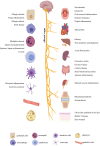Nicotine in Inflammatory Diseases: Anti-Inflammatory and Pro-Inflammatory Effects
- PMID: 35251010
- PMCID: PMC8895249
- DOI: 10.3389/fimmu.2022.826889
Nicotine in Inflammatory Diseases: Anti-Inflammatory and Pro-Inflammatory Effects
Abstract
As an anti-inflammatory alkaloid, nicotine plays dual roles in treating diseases. Here we reviewed the anti-inflammatory and pro-inflammatory effects of nicotine on inflammatory diseases, including inflammatory bowel disease, arthritis, multiple sclerosis, sepsis, endotoxemia, myocarditis, oral/skin/muscle inflammation, etc., mainly concerning the administration methods, different models, therapeutic concentration and duration, and relevant organs and tissues. According to the data analysis from recent studies in the past 20 years, nicotine exerts much more anti-inflammatory effects than pro-inflammatory ones, especially in ulcerative colitis, arthritis, sepsis, and endotoxemia. On the other hand, in oral inflammation, nicotine promotes and aggravates some diseases such as periodontitis and gingivitis, especially when there are harmful microorganisms in the oral cavity. We also carefully analyzed the nicotine dosage to determine its safe and effective range. Furthermore, we summarized the molecular mechanism of nicotine in these inflammatory diseases through regulating immune cells, immune factors, and the vagus and acetylcholinergic anti-inflammatory pathways. By balancing the "beneficial" and "harmful" effects of nicotine, it is meaningful to explore the effective medical value of nicotine and open up new horizons for remedying acute and chronic inflammation in humans.
Keywords: anti-inflammation; immune; nAChRs; nicotine; pro-inflammation; vagus.
Copyright © 2022 Zhang, Lin, Zou, Yuan, Huang, Pan and Zhang.
Conflict of interest statement
The authors declare that the research was conducted in the absence of any commercial or financial relationships that could be construed as a potential conflict of interest.
Figures



Similar articles
-
Anti-inflammatory effects of nicotine in obesity and ulcerative colitis.J Transl Med. 2011 Aug 2;9:129. doi: 10.1186/1479-5876-9-129. J Transl Med. 2011. PMID: 21810260 Free PMC article. Review.
-
Dexmedetomidine controls systemic cytokine levels through the cholinergic anti-inflammatory pathway.Inflammation. 2014 Oct;37(5):1763-70. doi: 10.1007/s10753-014-9906-1. Inflammation. 2014. PMID: 24803295
-
Local administration of 4-Thiouridine, a novel molecule with potent anti-inflammatory properties, protects against experimental colitis and arthritis.Int Immunopharmacol. 2020 Aug;85:106598. doi: 10.1016/j.intimp.2020.106598. Epub 2020 May 19. Int Immunopharmacol. 2020. PMID: 32442901
-
Peroxidase-Mimicking Nanoassembly Mitigates Lipopolysaccharide-Induced Endotoxemia and Cognitive Damage in the Brain by Impeding Inflammatory Signaling in Macrophages.Nano Lett. 2018 Oct 10;18(10):6417-6426. doi: 10.1021/acs.nanolett.8b02785. Epub 2018 Sep 27. Nano Lett. 2018. PMID: 30247915
-
Exploitation of the nicotinic anti-inflammatory pathway for the treatment of epithelial inflammatory diseases.World J Gastroenterol. 2006 Dec 14;12(46):7451-9. doi: 10.3748/wjg.v12.i46.7451. World J Gastroenterol. 2006. PMID: 17167832 Free PMC article. Review.
Cited by
-
Butyrate Protects and Synergizes with Nicotine against Iron- and Manganese-induced Toxicities in Cell Culture.Neurotox Res. 2023 Dec 14;42(1):3. doi: 10.1007/s12640-023-00682-z. Neurotox Res. 2023. PMID: 38095760
-
Household smoking impact on the oral health of 5- to 7-years-old children.BMC Oral Health. 2023 Dec 19;23(1):1028. doi: 10.1186/s12903-023-03715-3. BMC Oral Health. 2023. PMID: 38114982 Free PMC article.
-
Causal Associations Between Tobacco, Alcohol Use and Risk of Infectious Diseases: A Mendelian Randomization Study.Infect Dis Ther. 2023 Mar;12(3):965-977. doi: 10.1007/s40121-023-00775-4. Epub 2023 Mar 2. Infect Dis Ther. 2023. PMID: 36862322 Free PMC article.
-
The Distinct Biological Effects of 6-Hydroxy-L-Nicotine in Representative Cancer Cell Lines.Molecules. 2024 Nov 26;29(23):5593. doi: 10.3390/molecules29235593. Molecules. 2024. PMID: 39683752 Free PMC article.
-
Insights into Pharmacological Activities of Nicotine and 6-Hydroxy-L-nicotine, a Bacterial Nicotine Derivative: A Systematic Review.Biomolecules. 2023 Dec 23;14(1):23. doi: 10.3390/biom14010023. Biomolecules. 2023. PMID: 38254623 Free PMC article.
References
Publication types
MeSH terms
Substances
LinkOut - more resources
Full Text Sources
Medical
Research Materials
Miscellaneous

